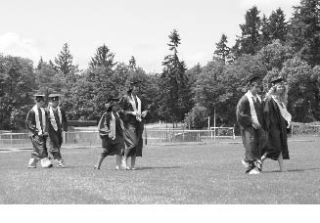The word adolescent is derived from the Latin word adolescere, which literally translated means “to grow.”
This should come as no surprise, considering the radical and at times volatile stage in human development the word represents.
Adolescence is all about growth and transition. These two things are currently a concept in the forefront of many young minds all over Vashon Island.
Freshly graduated seniors have already heard their last high school bell and are steeling themselves for the next and often final phase of their education. Juniors, like myself, are anxiously awaiting their ascension to the apex of the high school pecking order next fall, all the while wondering how they managed to become the upperclassmen they looked up to just months ago.
In light of this hallowed rite of passage, an examination of the oft-misunderstood role of youth seems relevant.
Perhaps the most necessary prerequisite to determining when a youngster becomes an adult is to distinguish between the categories. This is much easier said than done. Teenagers, and indeed, even adults, have a variety of maturity levels, making it often nearly impossible for a member of one camp to discern how much respect a member of the other deserves.
I interviewed recently graduated senior Ravenna Koenig, president of the Vashon Youth Council, about the exact point at which the conversion from child to adult occurs.
“It’s a very gradual transition. It’s an acceptance of responsibility and learning how to juggle obligations and expectations,” said Koenig. “You have to have some way of transitioning into a leadership role in your community, which is what every adult should attain.”
By Koenig’s definition, adulthood is not necessarily dependent on age, but rather on the level of maturity and responsibility an individual displays. For some, it may not be possible to attain the appropriate amounts of maturity and responsibility until they have graduated from high school and are considered adults by the federal government.
But to even entertain the idea that a teenager could have all the qualities of a mature adult questions the conventional hierarchy that exists between adolescents and their elders. If a young person has all the facets of an adult personality, haven’t they, by the caliber of their character, earned the right to be treated like one?
This is a question that has been a source of contention for quite some time. Koenig, however, said that the Vashon community responded very positively to her attempts to earn respect.
“I think that I have been treated very well by the adults in my community, because I’ve demanded it,” said Koenig.
This statement is very complimentary, coming from someone so extensively enmeshed in the internal affairs of the Island. It would be impossible for the adults in many communities in this country to truthfully state that a teenager can be respected and supported in their endeavors if they are confident enough to ask it of them.
Vashon’s problem, however, is that of the many mature youth living in the community who desire and deserve empowerment and respect, not all of them are confident enough to demand it of the aged. When asked how she hoped to relate towards youth as an adult, Koenig stressed the importance of being attentive.
“As an adult, I hope to be the kind of person that looks for a way to listen to people or help them articulate themselves,” said Koenig.
Adolescent rebellion is an inalienable part of the human psyche. It has been around for generations, and it won’t be going away any time soon — but equilibrium between benefactor and beneficiary is attainable.
The best thing adults can do in a community to attain this balance is respect the Vashon youth and provide them with as many opportunities to express and empower themselves as possible. Being a benevolent adult can turn youth into an excellent catalyst for positive action within the community by giving them responsibilities proportionate to their abilities.
Listening to kids can help prevent negative activities in the way they were meant to be prevented, not by discouraging participation in unhealthy activities, but by encouraging participation in healthy ones.
Joe Sutton-Holcomb is a member of the class of 2009 at Vashon High School, the incoming senior class, and he’s a staff reporter at The Riptide.



